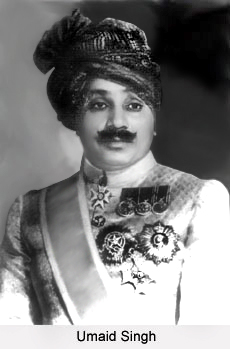 Umaid Singh was the ruler or Maharaja of Jodhpur who reigned over the territory from the year 1918 until 1947, when he died. He was born on 8th July 1903 as the second son of Sir Sardar Singh, the then Maharaja of Jodhpur. Umaid Singh succeeded Maharaja Sir Sumair Singh, his elder brother, after his death in the year 1918. He served as the ADC to the Prince of Wales, later Edward VIII in 1922. As he was still a minor at the time of his succession of the throne, his granduncle became regent until he reached the age of majority in 1923. Lord Reading formally invested him as the Maharaja and gave him full ruling rights.
Umaid Singh was the ruler or Maharaja of Jodhpur who reigned over the territory from the year 1918 until 1947, when he died. He was born on 8th July 1903 as the second son of Sir Sardar Singh, the then Maharaja of Jodhpur. Umaid Singh succeeded Maharaja Sir Sumair Singh, his elder brother, after his death in the year 1918. He served as the ADC to the Prince of Wales, later Edward VIII in 1922. As he was still a minor at the time of his succession of the throne, his granduncle became regent until he reached the age of majority in 1923. Lord Reading formally invested him as the Maharaja and gave him full ruling rights.
Under his rule, Sir Umaid Singh reorganised and reformed the Jodhpur State Forces and the judicial department. Further more, he also introduced a scheme for expanding primary education and established state pensions, revised the land revenue settlement and incorporated a Provident Fund for state employees. Maharaja Umaid Singh of Jodhpur also had an illustrious military career as well.
Sir Umaid Singh died at the age of 43 on 9 June 1947 at his estate on Mount Abu, after a successful reign of 29 years.
This article is a stub. You may enrich it by adding more information to it. You can send your write-up at content@indianetzone.com



















